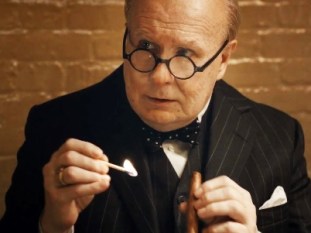 It might almost be worth seeing the new movie Gotti with a sneering John Travolta in the lead, simply because it has received a (surprisingly) rare “0” rating from Rotten Tomatoes critics. Unanimity about a movie’s goodness or apparent awfulness is so rarely achieved that this may be a cinematic low-water-mark. A filmic Sahara. A future cult classic.
It might almost be worth seeing the new movie Gotti with a sneering John Travolta in the lead, simply because it has received a (surprisingly) rare “0” rating from Rotten Tomatoes critics. Unanimity about a movie’s goodness or apparent awfulness is so rarely achieved that this may be a cinematic low-water-mark. A filmic Sahara. A future cult classic.
Last weekend, I went to another movie most critics have panned, because it is crammed with components I like: spies! history! Nazis! baseball! Based on a book by Nicholas Dawidoff, it recounts a bit of the true story of Red Sox catcher Moe Berg and was directed by Ben Lewin (who gets most of the blame), with a good script by Robert Rodat (trailer).
It wasn’t perfect, and maybe it’s slow for action film devotees, but the acting was superior. Paul Rudd played Berg, a man who loved baseball and had a great smile, but was hard to know. Through his Princeton connections, he was recruited to the fledgling OSS by its head Wild Bill Donovan (Jeff Daniels), mostly because of his facility with languages and despite his somewhat ambiguous sexuality. He has a girlfriend in Boston (Sienna Miller) for much of the film, but that’s an on-again, off-again thing, first with his baseball travel schedule, then his work in Washington and overseas.
Finally he gets the kind of assignment he craves: the U.S. has the Manhattan Project to develop a nuclear weapon, and the Allies believe the Germans are attempting this too, led by Werner Heisenberg (Mark Strong). But they can’t be certain (sorry). Berg is teamed up with a military man (Guy Pearce) and a physicist (excellent work by Paul Giamatti) to find out. If these suspicions are correct, Berg is to assassinate him. Unlike so many celluloid spies, Rudd’s Berg seems actually to weigh the significance of this assignment.
In a key scene early in the film, Berg signals the pitcher, but the pitcher waves him off. The opponent on first tries to steal second, but Berg manages to get the ball there in time to throw him out, ending the inning. Walking back to the dugout, he says to the pitcher, “Never ignore my signal when a man’s going to try to steal second.” Pitcher: “How’d you know he’d try?” “I just knew.” Berg’s skill in sizing up people was perfect for the OSS.
Rex Reed in the New York Observer said, it’s “a juicy story told blandly,” but still a movie worth seeing, and I agree. Maybe Gotti should get a second look.
Rotten Tomatoes critics rating: 32%; audiences 67%.


 Overwhelmed by the tsunami of pettiness and downright meanness in the news this summer? These biopics make a refreshing change. RBG and Won’t You Be My Neighbor? properly celebrate two talented individuals who single-mindedly dedicated themselves to making better the lives of others.
Overwhelmed by the tsunami of pettiness and downright meanness in the news this summer? These biopics make a refreshing change. RBG and Won’t You Be My Neighbor? properly celebrate two talented individuals who single-mindedly dedicated themselves to making better the lives of others. When I saw previews of this Morgan Neville documentary about children’s television personality Fred Rogers, I was afraid it might be overly saccharine (
When I saw previews of this Morgan Neville documentary about children’s television personality Fred Rogers, I was afraid it might be overly saccharine (

 The story of 20th century figure Judge Francis Biddle comes alive in Trying, an engaging play by Joanna McClelland Glass, who was Biddle’s assistant during his last year of life. On stage at the
The story of 20th century figure Judge Francis Biddle comes alive in Trying, an engaging play by Joanna McClelland Glass, who was Biddle’s assistant during his last year of life. On stage at the  This beneath-the-radar film directed by Paul McGuigan (script by Matt Greenhalgh) shows the last days of Academy-Award-winning actress Gloria Grahame (
This beneath-the-radar film directed by Paul McGuigan (script by Matt Greenhalgh) shows the last days of Academy-Award-winning actress Gloria Grahame ( While Watergate revelations piled up daily in the early 1970s, in all the excruciating details of high-level misdeeds, one mystery remained: Who was the high-ranking source, “Deep Throat”? Washington Post reporters gave this name to one of history’s most important whistle-blowers.
While Watergate revelations piled up daily in the early 1970s, in all the excruciating details of high-level misdeeds, one mystery remained: Who was the high-ranking source, “Deep Throat”? Washington Post reporters gave this name to one of history’s most important whistle-blowers. Another biopic that doesn’t live up to its source material is Reginald Hudlin’s Marshall, written by Jacob and Michael Koskoff (
Another biopic that doesn’t live up to its source material is Reginald Hudlin’s Marshall, written by Jacob and Michael Koskoff (






 Perhaps you feel about Churchilled out, what with Netflix’s
Perhaps you feel about Churchilled out, what with Netflix’s 



